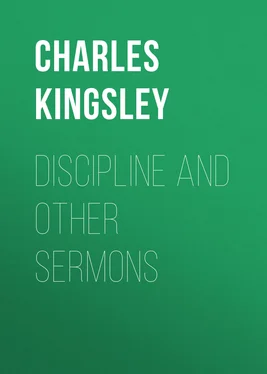Charles Kingsley - Discipline and Other Sermons
Здесь есть возможность читать онлайн «Charles Kingsley - Discipline and Other Sermons» — ознакомительный отрывок электронной книги совершенно бесплатно, а после прочтения отрывка купить полную версию. В некоторых случаях можно слушать аудио, скачать через торрент в формате fb2 и присутствует краткое содержание. Жанр: foreign_prose, foreign_religion, Философия, foreign_psychology, foreign_antique, на английском языке. Описание произведения, (предисловие) а так же отзывы посетителей доступны на портале библиотеки ЛибКат.
- Название:Discipline and Other Sermons
- Автор:
- Жанр:
- Год:неизвестен
- ISBN:нет данных
- Рейтинг книги:4 / 5. Голосов: 1
-
Избранное:Добавить в избранное
- Отзывы:
-
Ваша оценка:
- 80
- 1
- 2
- 3
- 4
- 5
Discipline and Other Sermons: краткое содержание, описание и аннотация
Предлагаем к чтению аннотацию, описание, краткое содержание или предисловие (зависит от того, что написал сам автор книги «Discipline and Other Sermons»). Если вы не нашли необходимую информацию о книге — напишите в комментариях, мы постараемся отыскать её.
Discipline and Other Sermons — читать онлайн ознакомительный отрывок
Ниже представлен текст книги, разбитый по страницам. Система сохранения места последней прочитанной страницы, позволяет с удобством читать онлайн бесплатно книгу «Discipline and Other Sermons», без необходимости каждый раз заново искать на чём Вы остановились. Поставьте закладку, и сможете в любой момент перейти на страницу, на которой закончили чтение.
Интервал:
Закладка:
What befell the Rechabites when Jerusalem was destroyed, we know not: but they seem to have returned to their old life, and wandered away into the far east; for in the twelfth century, more than one thousand years after, a Jewish traveller met with them 100,000 strong under a Jewish prince of the house of David; still abstaining from wine and flesh, and paying tithes to teachers who studied the law, and wept for the fall of Jerusalem. And even yet they are said to endure and prosper. For in our own time, a traveller met the Rechabites once more in the heart of Arabia, still living in their tents, still calling themselves the sons of Jonadab. With one of them, Mousa ( i.e. Moses) by name, he talked, and Mousa said to him, ‘Come, and I will show you who we are;’ and from an Arabic bible he read the words of my text, and said, ‘You will find us 60,000 in number still. See, the words of the prophet have been fulfilled—“Jonadab the son of Rechab shall not want a man to stand before me for ever.”’
What lesson shall we learn from this story—so strange, and yet so beautiful? What lesson need we learn, save that which the Holy Scripture itself bids us learn? The blessing which comes upon reverence for our forefathers, and above all for God, our Father in Heaven.
Reverence for our forefathers. These are days in which we are too apt to sneer at those who have gone before us; to look back on our forefathers as very ignorant, prejudiced, old-fashioned people, whose opinions have been all set aside by the progress of knowledge.
Be sure that in this temper of mind lies a sin and a snare. If we wish to keep up true independence and true self-respect in ourselves and our children, we should be careful to keep up respect for our forefathers. A shallow, sneering generation, which laughs at those who have gone before it, is ripe for disaster and slavery. We are not bound, of course—as those old Rechabites considered themselves bound—to do in everything exactly what our forefathers did. For we are not under the law, but under grace; and where the Spirit of the Lord is, there is liberty—liberty to change, improve, and develop as the world grows older, and (we may hope) wiser. But we are bound to do, not exactly what our forefathers did, but what we may reasonably suppose that they would have done, had they lived now, and were they in our places. We are to obey them, not in the letter, but in the spirit.
And whenever, in the prayer for the Church militant, we commemorate the faithful dead, and thank God for all his servants departed this life in his faith and fear, we should remember with honest pride that we are thanking God for our own mothers and fathers, and for those that went before them; ay, for every honest God-fearing man and woman, high or low, who ever did their duty by God and their neighbours, and left, when they died, a spot of this land somewhat better than they found it.
And for God; the Father of all fathers; our Father in heaven—Oh, my friends, God grant that it may never be said to any of us, Behold the words of Jonadab the son of Rechab, which he commanded his children, are performed: but ye have not hearkened unto me. I have sent also unto you, saith God, not merely my servants the prophets, but my only-begotten, Jesus Christ your Lord, saying, ‘Return you now every man from his evil way, and amend your doings, and go not after other gods to serve them, and ye shall dwell in the land which I have given to you and to your fathers. But ye have not inclined your ear, nor hearkened unto me.’
God grant that that may never be said to any of us. And yet it is impossible to deny—impossible to shut our eyes to the plain fact—that Englishmen now-a-days are more and more forgetting that there are any commandments of God whatsoever; any everlasting laws laid down by their Heavenly Father, which, if they break, will avenge themselves by our utter ruin. We do not go after other gods, it is true, in the sense of worshipping idols. But there is another god, which we go after more and more; and that is money; gain; our interest (as we call it):—not knowing that the only true interest of any man is to fear God and keep his commandments. We hold more and more that a man can serve God and mammon; that a man must of course be religious, and belong to some special sect, or party, or denomination, and stand up for that fiercely enough: but we do not hold that there are commandments of God which say for ever to the sinner, ‘Do this and thou shalt live;’ ‘Do this or thou shalt die.’
We hold that because we are not under the law, but under grace, there is no condemnation for sin—at least for the special sort of sin which happens to be in fashion, which is now-a-days the sin of making money at all risks. We hold that there is one law of morality for the kingdom of heaven, and another for the kingdom of mammon. Therefore we hold, more and more, that when money is in question anything and everything is fair. There are—we have reason to know it just now but too well—thousands who will sell their honour, their honesty, yea, their own souls, for a few paltry pounds, and think no shame. And if any one says, with Jeremiah the prophet, ‘These are poor, they know not the way of the Lord, nor the judgment of their God. I will get me to the great men, for they have known the way of the Lord, and the judgment of their God:’—then will he find, as Jeremiah did, that too many of these great and wealthy worshippers of mammon have utterly broken the yoke, and burst the bonds, of all moral law of right and wrong: heaping up vast fortunes amid the ruin of those who have trusted them, and the tears of the widow and the orphan, by means now glossed over by fine new words, but called in plain honest old English by a very ugly name.
How many there are in England now, my friends, who would laugh in their hearts at those worthy Rechabites, and hold them to be ignorant, old-fashioned, bigoted people, for keeping up their poor, simple, temperate life, wandering to and fro with their tents and cattle, instead of dwelling in great cities, and making money, and becoming what is now-a-days called civilized, in luxury and covetousness. Surely according to the wisdom of this world, the Rechabites were foolish enough. But it is the wisdom of this world itself—not simplicity and loyalty like theirs—which is foolishness with God.
My friends, let us all take warning, each man for himself. When a nation corrupts itself—as we seem inclined to do now, by luxury and covetousness, selfishness and self-will, forgetting more and more loyalty and order, honesty and high principle—then some wholesome, but severe judgment of God, is sure to come upon that nation: a day in which all faces shall gather blackness: a day of gloominess and thick darkness, like the morning spread upon the mountains.
For the eternal laws of God’s providence are still at work, though we choose to forget them; and the Judge who administers them is the same yesterday, to-day, and for ever, even Jesus Christ the Lord, the everlasting Rock, on which all morality and all society is founded. Whosoever shall fall on that Rock in repentance and humility, confessing, bewailing, and forsaking his worldliness and sinfulness, he shall indeed be broken: but of him it is written, ‘The sacrifices of God are a broken spirit: a broken and a contrite heart, O God, thou wilt not despise.’ And he shall find that Rock, even Christ, a safe standing-ground amid the slippery mire of this world’s temptations, and the storms and floods of trouble which are coming—it may be in our children’s days—it may be in our own.
But he who hardens his heart: he who says proudly, ‘We are they that ought to speak; who is Lord over us?’—he who says carelessly, ‘Soul, take thine ease; thou hast much goods laid up for many years’—he who halts between two opinions, and believes to the last that he can serve both God and mammon—he, especially, who fancies that falsehood, injustice, covetousness, and neglect of his fellow-men, can properly be his interest, or help his interest in any wise—of all such it is written, ‘On whomsoever that Rock’—even the eternal laws of Christ the Judge—‘On whomsoever that Rock shall fall, it shall grind him to powder.’
Читать дальшеИнтервал:
Закладка:
Похожие книги на «Discipline and Other Sermons»
Представляем Вашему вниманию похожие книги на «Discipline and Other Sermons» списком для выбора. Мы отобрали схожую по названию и смыслу литературу в надежде предоставить читателям больше вариантов отыскать новые, интересные, ещё непрочитанные произведения.
Обсуждение, отзывы о книге «Discipline and Other Sermons» и просто собственные мнения читателей. Оставьте ваши комментарии, напишите, что Вы думаете о произведении, его смысле или главных героях. Укажите что конкретно понравилось, а что нет, и почему Вы так считаете.












